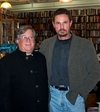Best Novel: California Girl by T. Jefferson Parker (William Morrow)
Best First Novel: Country of Origin by Don Lee (W.W. Norton & Co)
Best Paperback Original: The Confession by Domenic Stansberry (Hard Case Crime)
Best Short Story: "Something About a Scar" – Anything You Say Can and Will Be Used Against You by Laurie Lynn Drummond (HarperCollins)
Best Fact Crime: Conviction: Solving the Moxley Murder: A Reporter and a Detective’s Twenty-Year Search for Justice by Leonard Levitt (Regan Books)
Best Critical/Biographical: The New Annotated Sherlock Holmes: The Complete Short Stories edited by Leslie S. Klinger (W.W. Norton)
Best Young Adult: In Darkness, Death by Dorothy & Thomas Hoobler (Philomel Books)
Best Juvenile: Chasing Vermeer by Blue Balliett (Scholastic Press)
Best Play: Spatter Pattern (Or, How I Got Away With It) by Neal Bell (Playwrights Horizons)
Best Television Episode Teleplay: Law & Order: Criminal Intent – "Want", Teleplay by Elizabeth Benjamin.
Story by René Balcer & Elizabeth Benjamin
Best Television Feature or Miniseries Teleplay: State of Play by Paul Abbott (BBC America)
Best Motion Picture Screenplay: A Very Long Engagement – Screenplay by Jean-Pierre Jeunet, based on the Novel by Sébastien Japrisot (2003 Productions)
(Thanks to Sarah Weinman, from whom I stole this post)







